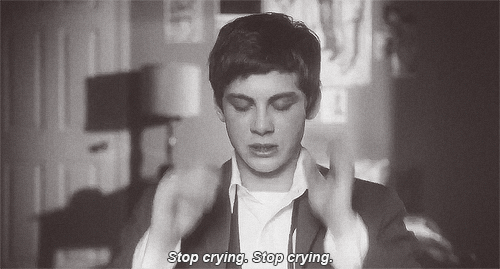- mental illness
- gender
Here is a prezi that briefly explains how we challenged stereotypes of gender and particularly mental illness:
We wanted to challenge the stereotype of men/boys being confident and unemotional, demonstrating this with:
- mise-en-scene: clothing challenging the jock/sporty male stereotype
- dialogue + facial expressions/body language:
- voiceover: "I was diagnosed with obsessive-compulsive disorder and social anxiety issues…" showing that men can have these issues too - similar to Charlie in the Perks of Being A Wallflower
Like in The Perks of Being A Wallflower and It's Kind of A Funny Story, we focused our representation of mental illness on young people:
We wanted to challenge the stereotype of men/boys being confident and unemotional, demonstrating this with:
- mise-en-scene: clothing challenging the jock/sporty male stereotype
 |
| checkered shirt - quite smart, showing that he cares about his appearance |
 |
| his anxious expressions/holding his arms close to him indicate his social anxiety, something not typically experienced by male characters |
Like in The Perks of Being A Wallflower and It's Kind of A Funny Story, we focused our representation of mental illness on young people:
- to appeal to our target audience of 16-24 year olds
- because it seems to be a common issue among this age group
- to give young people suffering with these problems something to relate to
- to challenge stigma against mental illness and show that it isn't something to be ashamed of
Although we wanted our film to be a comedy/drama, we wanted to avoid turning mental illness into a joke and making it too melodramatic. We aimed to create an honest portrayal of mental illness that would not make anyone feel like they were being laughed at or pitied.
We created the more light-hearted aspect of the film using mise-en-scene rather than trying to turn Christopher's illness into something funny:
 |
| Christopher's outfit: colourful but not so eccentric that he seems bizarre |
 |
| Setting here: coloured mural in the background creates a sense of light-heartedness |
With the dialogue, Christopher quite matter-of-factly states that: "I was diagnosed with obsessive-compulsive disorder." We see symptoms of this:
 |
| (THIS GIF WAS MADE BY BRANDON) |
These do not make fun of his mental illness nor is it melodramatic. They don't intentionally conform to stereotypes of OCD - we simply aimed to present it honestly.
It is still presented as an important issue, though - the close-ups of his habits indicate the significance of his OCD traits on his life. This way we could present OCD as not just a preference to be clean and tidy, as many people think, but as a disorder that can take control of someone's life.




No comments:
Post a Comment